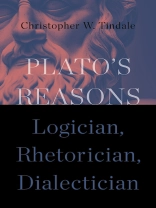Studies Plato’s approach to argumentation, exploring his role as logician, rhetorician, and dialectician in a way that sees these three aspects working together.
This book explores Plato’s implicit understanding of argumentation by reviewing his standing as a logician, rhetorician, and dialectician. The question of his ‘standing’ on these matters is approached on his terms (gleaned from the dialogues) rather than simply from the judgments of commentators. Traditionally, arguments are distinguished as logical, rhetorical, or dialectical, and the source of these distinctions is taken to be Aristotle. This book proceeds on the assumption that Aristotle’s tripartite theory of argumentation did not arise in a vacuum and explores the different degrees to which substantive antecedents of parts of that model can be traced to Plato.
Mục lục
Acknowledgments
Abbreviations and Translations
General Introduction: Inside the City of Reason
Part I: The Logician
Introduction to Part I: Plato and the Intricacies of Logic
1. Socratic Arguments
2. Refutation: The Logic of the Early Dialogues
3. Contentious Arguments: Preconditions for Aristotle’s Theory of ‘Fallacy’ in the Dialogues of Plato
4. Strong Arguments
Part II: The Rhetorician
Introduction to Part II: Plato’s Style
5. Plato’s Attack on Rhetoric: Fractures in the Standard Narrative
6. The Atopic Philosopher
7. Platonic Devices
8. Back in Plato’s Labyrinth: The Rhetorical Challenges of the Republic
9. Rhetoric in the Middle Plato and Beyond
Part III: The Dialectician
Introduction to Part III: A New Dialectic
10. Tracing Dialectic
11. The Song that Dialectic Sings: Methods in the Middle Dialogues
12. The Dialectician
References
Index
Giới thiệu về tác giả
Christopher W. Tindale is Director of the Centre for Research in Reasoning, Argumentation, and Rhetoric at the University of Windsor in Canada. He is the author of How We Argue: 30 Lessons in Persuasive Communication and The Anthropology of Argument: Cultural Foundations of Rhetoric and Reason, among other books.












